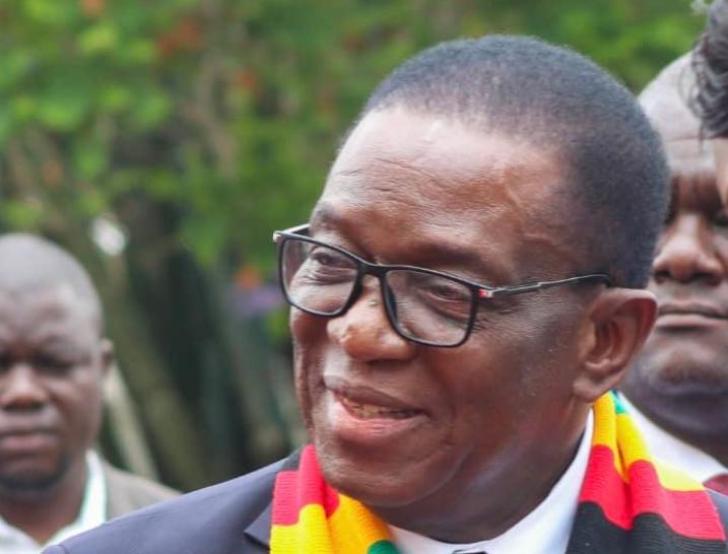News / National
Mnangagwa tells Britain to apologise
05 Nov 2024 at 08:17hrs |
3 Views

President Emmerson Mnangagwa has called on the British government to apologize for its century-long colonial rule in Zimbabwe, which dispossessed indigenous people of their land and subjected them to various forms of abuse. He made these remarks during the burial of national hero Jaison William Chirinda at the National Heroes Acre in Harare on Sunday.
"We demand an apology and reparations from the British government," Mnangagwa stated, underscoring the impact of colonial rule on Zimbabwe's people and resources. He added that Britain should also return the remains of Zimbabwean heroes currently held in British museums, where some are reportedly on display.
"The spirits of our heroes will not rest until their remains are repatriated and interred in a dignified way," Mnangagwa declared. He specifically called for the return of remains belonging to revered leaders like Chief Chiwashira, Chief Chingaira, Chief Mapondera, and Chief Mashayamombe, who were killed by colonial forces.
Mnangagwa also addressed the hardships endured by Zimbabweans in their fight for independence, describing the brutal tactics used to suppress the liberation struggle. He shared memories of imprisonment, where he, Chirinda, and other revolutionaries faced harsh, inhumane treatment.
"The colonial system was a scourge imposed on our nation by the British monarch and government, designed to dispossess us of our land and resources for their selfish benefit," Mnangagwa said. He recounted the impact of colonial laws like the 1930 Land Apportionment Act, which forced indigenous people into infertile parts of the country.
Regarding land redistribution, Mnangagwa defended Zimbabwe's compensation policy for white farmers, whose land was redistributed in recent decades. "The second republic is forthright in accommodating compensation of white former farmers in respect of improvements they made on the land redistributed by the State," he noted. However, he urged Britain to acknowledge its role in Zimbabwe's history and take responsibility for colonial abuses.
The president also paid tribute to Chirinda, a decorated freedom fighter who joined the liberation struggle in 1965 and trained in Tanzania and China. Chirinda, known by his Chimurenga name Chezhira, dedicated his life to the fight for independence and the betterment of his country.
"Today, we honour a national hero who chose to take up the fight for independence against what seemed an insurmountable enemy," Mnangagwa said. "In this developmental stage of our country, we need more young men and women with the same tenacity to push the national vision forward."
Born in 1942 in Gora, Madziva, Chirinda completed his primary education locally before heading to Zambia, where he continued his studies and eventually joined the liberation movement. He later received advanced military training in China, solidifying his commitment to Zimbabwe's freedom.
Chirinda's legacy, Mnangagwa said, serves as an inspiration to Zimbabwe's youth, as the nation continues to pursue self-determination and prosperity.
"We demand an apology and reparations from the British government," Mnangagwa stated, underscoring the impact of colonial rule on Zimbabwe's people and resources. He added that Britain should also return the remains of Zimbabwean heroes currently held in British museums, where some are reportedly on display.
"The spirits of our heroes will not rest until their remains are repatriated and interred in a dignified way," Mnangagwa declared. He specifically called for the return of remains belonging to revered leaders like Chief Chiwashira, Chief Chingaira, Chief Mapondera, and Chief Mashayamombe, who were killed by colonial forces.
Mnangagwa also addressed the hardships endured by Zimbabweans in their fight for independence, describing the brutal tactics used to suppress the liberation struggle. He shared memories of imprisonment, where he, Chirinda, and other revolutionaries faced harsh, inhumane treatment.
"The colonial system was a scourge imposed on our nation by the British monarch and government, designed to dispossess us of our land and resources for their selfish benefit," Mnangagwa said. He recounted the impact of colonial laws like the 1930 Land Apportionment Act, which forced indigenous people into infertile parts of the country.
Regarding land redistribution, Mnangagwa defended Zimbabwe's compensation policy for white farmers, whose land was redistributed in recent decades. "The second republic is forthright in accommodating compensation of white former farmers in respect of improvements they made on the land redistributed by the State," he noted. However, he urged Britain to acknowledge its role in Zimbabwe's history and take responsibility for colonial abuses.
The president also paid tribute to Chirinda, a decorated freedom fighter who joined the liberation struggle in 1965 and trained in Tanzania and China. Chirinda, known by his Chimurenga name Chezhira, dedicated his life to the fight for independence and the betterment of his country.
"Today, we honour a national hero who chose to take up the fight for independence against what seemed an insurmountable enemy," Mnangagwa said. "In this developmental stage of our country, we need more young men and women with the same tenacity to push the national vision forward."
Born in 1942 in Gora, Madziva, Chirinda completed his primary education locally before heading to Zambia, where he continued his studies and eventually joined the liberation movement. He later received advanced military training in China, solidifying his commitment to Zimbabwe's freedom.
Chirinda's legacy, Mnangagwa said, serves as an inspiration to Zimbabwe's youth, as the nation continues to pursue self-determination and prosperity.
Source - newsday
Join the discussion
Loading comments…




























